Understanding Vodka's Natural Origins
Is vodka natural? Yes, vodka is fundamentally natural - it's crafted from agricultural ingredients like grains or potatoes through biological fermentation and distillation processes, though the level of processing can vary significantly between brands.
Quick Answer:
- Base ingredients: Natural agricultural products (grains, potatoes, sugar beets)
- Production process: Natural fermentation + distillation
- Main components: Water (60%) + ethanol from fermented crops
- Natural aspects: Uses biological processes and agricultural raw materials
- Processing level: Varies from minimal to highly refined
For decades, vodka has carried the reputation of being a "neutral spirit" - colorless, odorless, and tasteless. This perception has led many to wonder whether vodka can truly be considered natural when it seems so stripped of character.
The reality is far more interesting. Vodka starts its journey in the soil, born from natural agricultural ingredients that undergo biological change. Whether distilled from Polish rye, Russian wheat, or Idaho potatoes, every bottle begins with crops that capture the essence of their terroir.
The confusion often stems from modern industrial production methods that prioritize neutrality over natural character. However, traditional vodka-making celebrates these agricultural roots, allowing subtle flavors and textures to shine through the distillation process.
I'm Sylwester Skóra, co-founder of Two Flags Vodka, where we've spent years perfecting the balance between honoring vodka's natural heritage and modern craftsmanship standards. My exploration of whether is vodka natural has taken me from Polish grain fields to American distilleries, always seeking to understand how nature and craft intersect in every bottle.
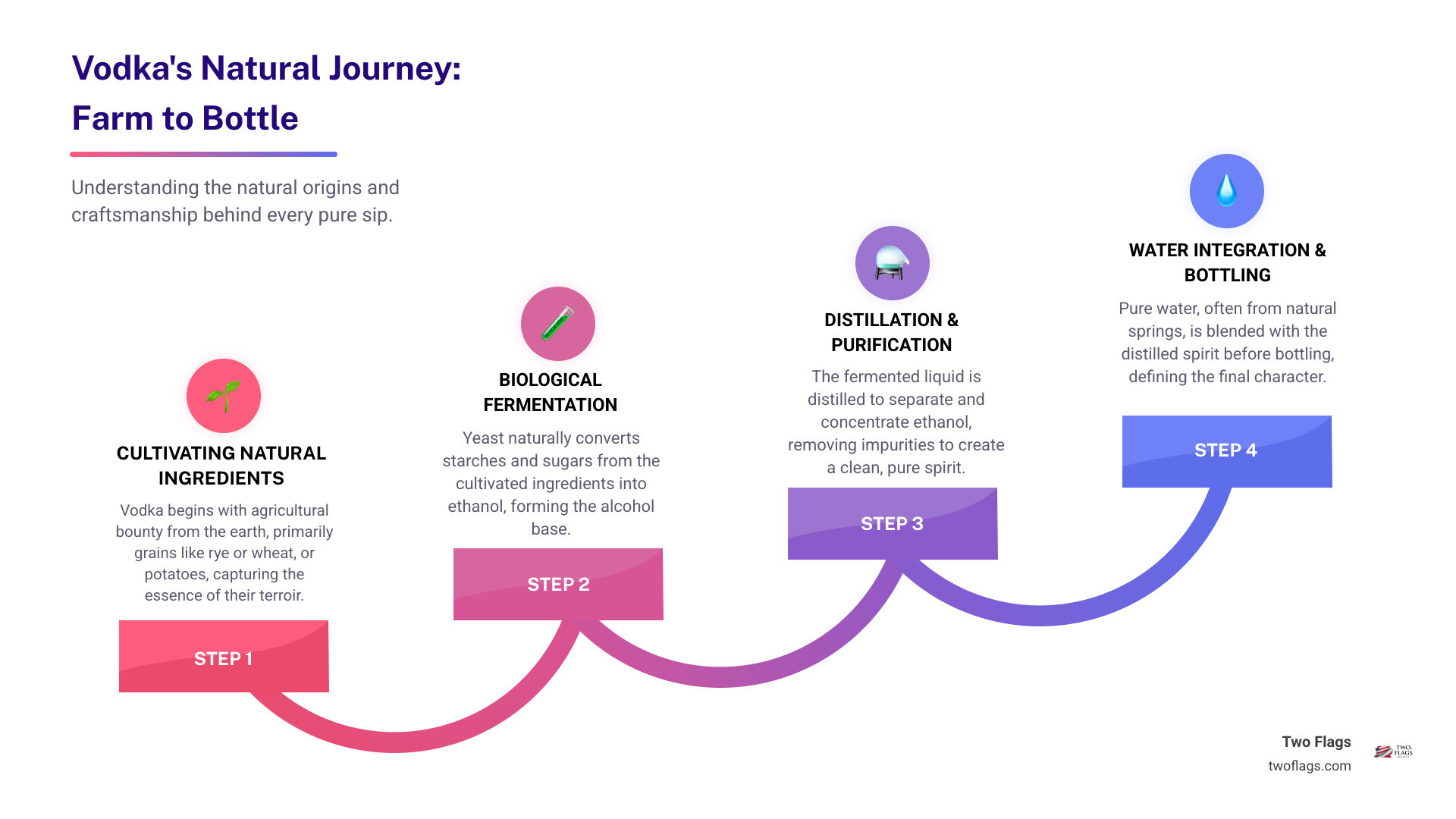
The Heart of Vodka: Natural Base Ingredients
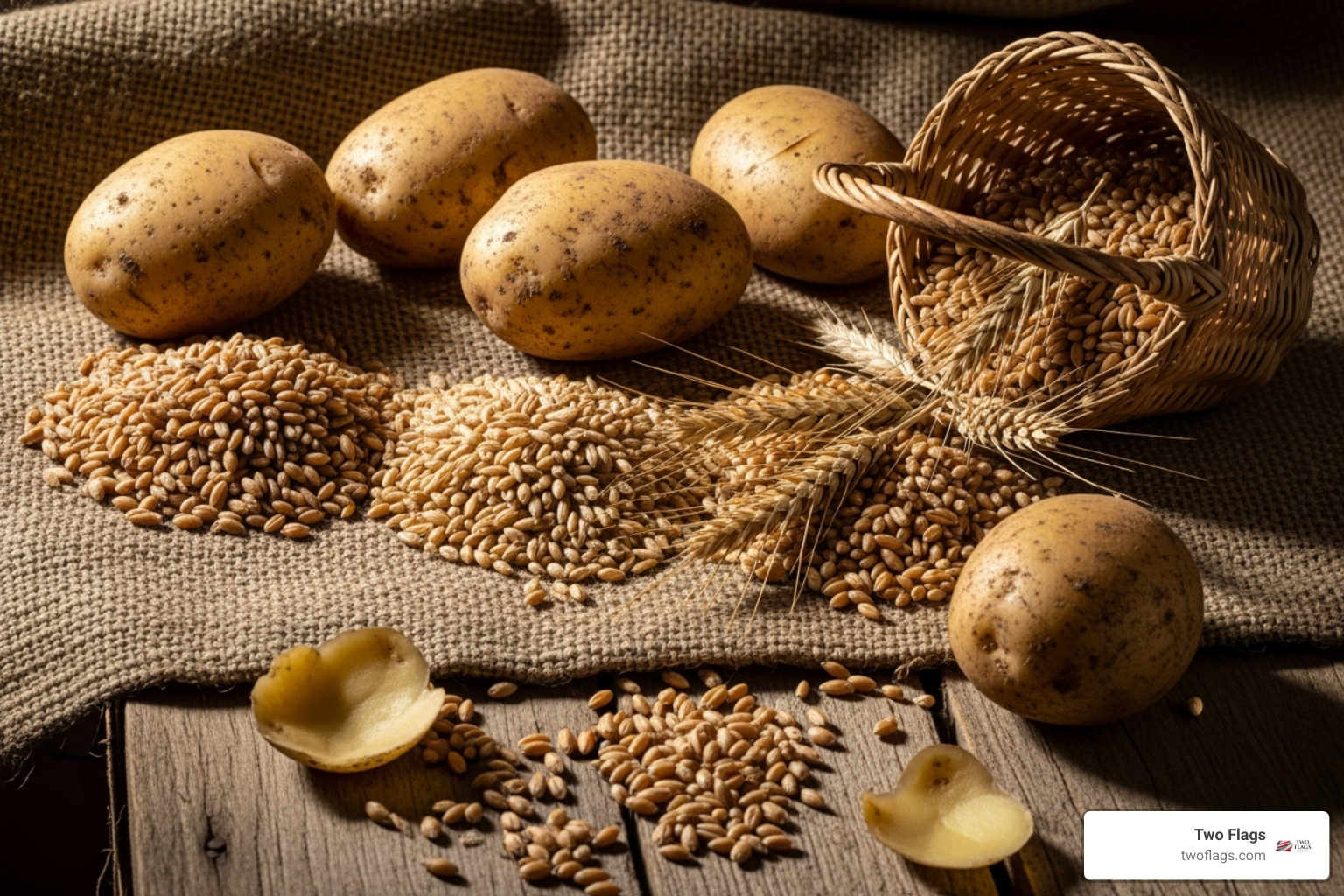
When you ask "is vodka natural?", the answer begins in the fields. Every bottle of vodka starts its life as something that grew from the earth - whether that's golden wheat swaying in Polish countryside, hearty potatoes pulled from rich soil, or tall stalks of rye reaching toward the sky.
The foundation of any vodka is what we call a fermentable base - natural ingredients packed with starches and sugars that yeast can transform into alcohol. It's a process as old as agriculture itself, and it's happening in the same way today as it did centuries ago.
Traditional ingredients tell the real story of vodka's natural origins. In Poland, where our Two Flags One Spirit vodka is crafted, rye has been the grain of choice for generations. There's something magical about Polish rye - it grows well in our climate and soil, creating the perfect foundation for authentic vodka.
Potatoes hold a special place in vodka history too. While many people think all vodka comes from potatoes, they actually make up only about 3% of global production. But what they lack in quantity, they make up for in character. Wheat rounds out the trinity of traditional vodka ingredients, offering its own gentle personality to the final spirit.
The beauty of vodka lies in its versatility. Beyond these classics, vodka can spring from sugar beets, corn, or even more unusual sources like honey. Each brings its own natural signature to the bottle, proving that vodka is far from the "flavorless" spirit some believe it to be.
Find the deep traditions behind Polish vodka making and how these time-honored ingredients create exceptional spirits.
How Ingredients Shape Flavor and Texture
Here's where the magic happens - and where we can definitively say "yes, vodka is natural" because each ingredient leaves its unique fingerprint on the final spirit.
Potato-based vodkas create something truly special. They bring a creamy, almost oily texture that coats your palate differently than grain-based spirits. There's an earthiness to potato vodka, sometimes with subtle nutty notes that whisper of the soil where those potatoes grew. It's like tasting the terroir itself.
Grain-based profiles offer their own distinct personalities. Rye brings spiciness - a gentle warmth that builds as you sip, with complex layers that unfold slowly. It's why we chose rye for Two Flags One Spirit vodka. Wheat delivers softness - smooth, clean, and subtly sweet, making it incredibly easy to drink neat or in cocktails.
These differences aren't accidents or impurities - they're features. When distillers choose their base ingredients, they're making an artistic decision about what experience they want to create. The natural sugars, proteins, and other compounds in each ingredient survive the distillation process in trace amounts, creating these beautiful subtle variations.
This connection between ingredient and final product is proof of vodka's natural heritage. Every sip connects you back to those original agricultural ingredients, even after all the careful crafting and distillation.
Learn more about the complete vodka crafting process and how each step preserves and refines these natural characteristics.
From Spring to Spirit: The Crucial Role of Water
Here's something that might surprise you: water makes up about 60% of every bottle of vodka. When we're asking is vodka natural, we can't ignore this fundamental ingredient that truly shapes the spirit's character.
Think about it - you could have the finest organic grains in the world, but if your water tastes like a swimming pool, your vodka will too. That's why the source and quality of water directly impact everything from taste to mouthfeel to that crystal-clear purity we expect from premium vodka.
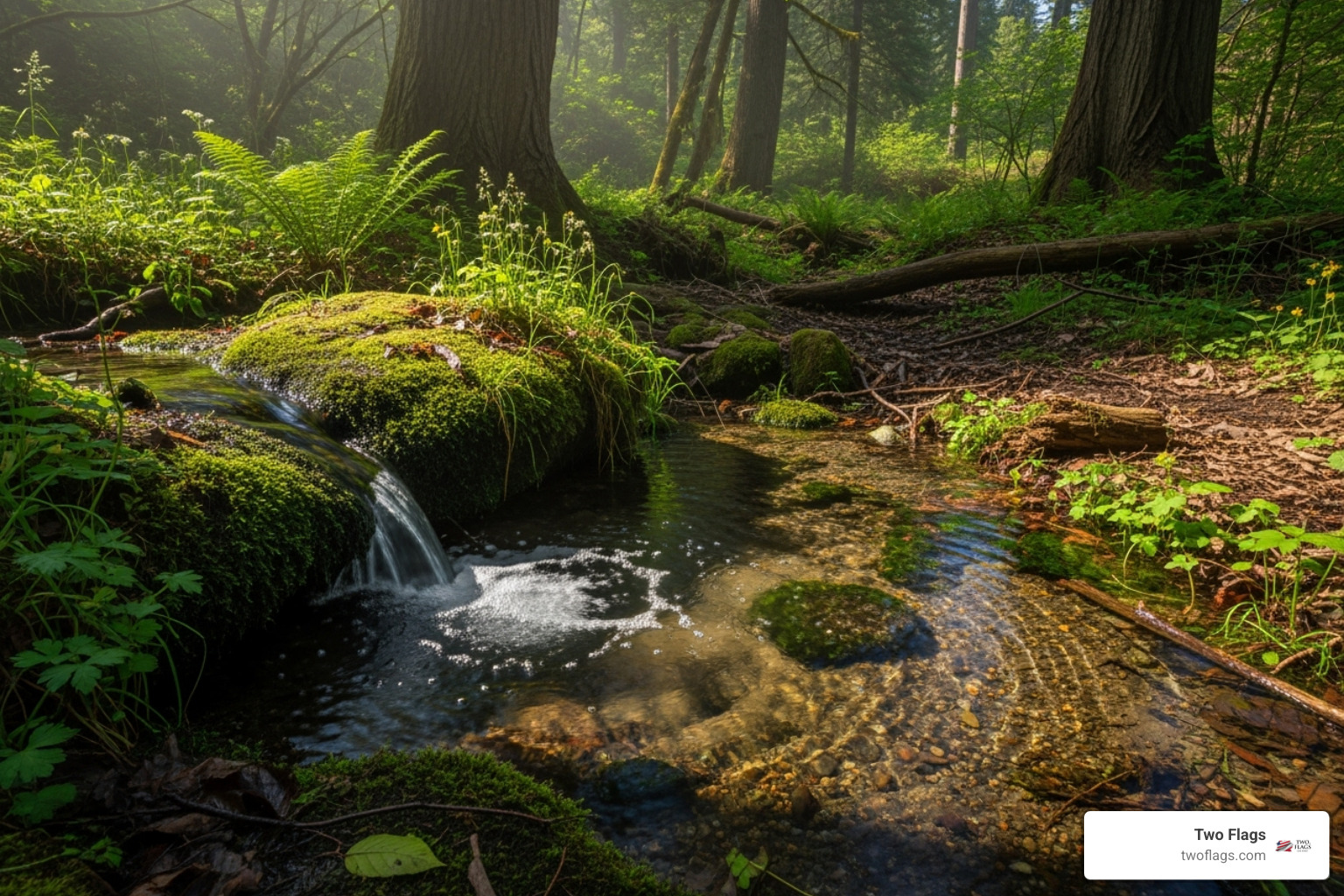
Traditional distilleries have always understood this connection. Many Polish distilleries, including those crafting our Two Flags One Spirit vodka, source their water from pristine artesian wells and natural springs. These underground sources have been naturally filtered through layers of rock and soil for decades, emerging pure and mineral-balanced.
But here's where it gets interesting - soft water is generally preferred over hard water for vodka production. Soft water, which is low in dissolved salts and minerals, allows the subtle characteristics of your base ingredients to shine through. It's like having a clean canvas that lets the true colors of your artwork show.
Of course, modern vodka production often employs advanced techniques like reverse osmosis and demineralization. Before you think this sounds "unnatural," remember that these processes are simply purifying what nature provided. The goal isn't to create something artificial - it's to remove any impurities that might cloud the vodka or create off-flavors.
The beauty lies in finding that perfect balance. Pure water improves rather than masks the natural character that comes from fermented grains or potatoes. It's the difference between a muddy pond and a crystal-clear mountain lake - both are natural, but one lets you see all the way to the bottom.
So, Is Vodka Natural? The Crafting Process Explained
The change from natural ingredients to that crystal-clear spirit in your glass tells a remarkable story. This is where answering "is vodka natural?" becomes truly fascinating.
At its heart, vodka contains just two main components: ethanol and water. The ethanol doesn't appear by magic - it's created through fermentation, one of nature's oldest biological processes. Think of it as a partnership between humans and yeast, those tiny single-celled organisms that have been our brewing companions for thousands of years.
During fermentation, yeast feasts on the sugars that come from breaking down starches in grains or potatoes. As they consume these sugars, they naturally produce alcohol and carbon dioxide. This fermented liquid, called a "wash" or "mash," typically reaches around 16% alcohol by volume. It's a completely natural biological process - we simply provide the right conditions for yeast to do what it does best.
Next comes distillation, where human craftsmanship meets natural science. This process separates alcohol from water and other compounds by using their different boiling points. When heated, alcohol vaporizes first because it boils at a lower temperature than water. These vapors are then collected and condensed back into liquid form, creating a much more concentrated alcohol.
The type of still used makes a real difference here. Column stills produce very pure, neutral spirits efficiently, while traditional copper pot stills preserve more character from the base ingredients. There's a common myth that more distillation always means better vodka - but that's not necessarily true. High-quality ingredients might actually benefit from fewer distillations to preserve their natural character.
Finally, the high-proof spirit gets filtered (often through activated charcoal) and diluted with pure water to reach the perfect drinking strength, usually around 40% alcohol. This careful filtration removes any remaining impurities while maintaining the spirit's essential character.
The entire journey - from fermentation through distillation to bottling - transforms natural agricultural products into the versatile spirit we know and love. Understand the essence of neutral spirits and their role in your favorite drinks.
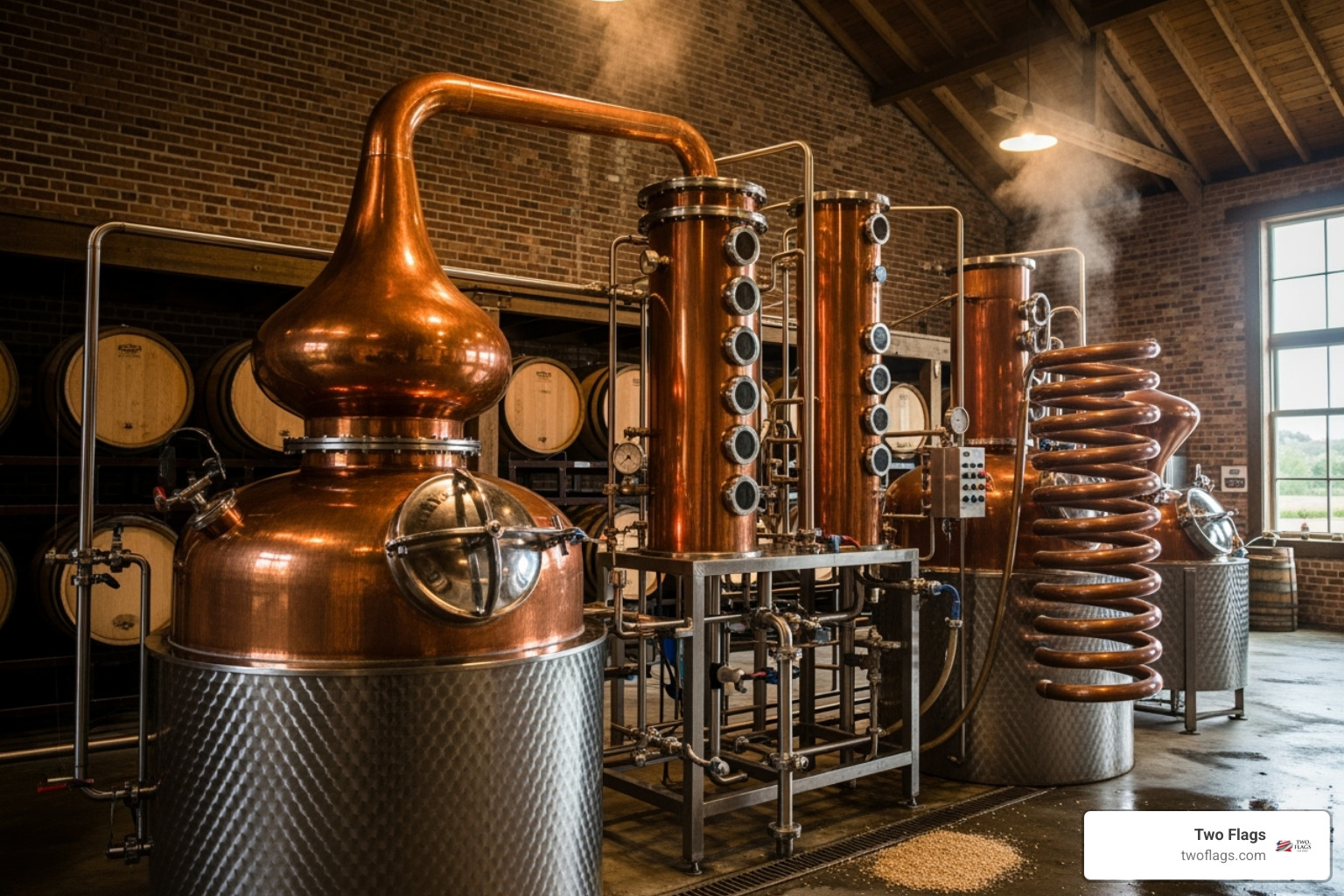
Defining "Natural" in the Context of Vodka
So what does "natural" really mean when we're talking about vodka? The answer lies in understanding how nature and human craftsmanship work together.
Vodka starts completely natural. It begins with natural agricultural sources - organic grains, potatoes, or other plant matter that grow from the earth. The change of these raw materials into alcohol happens through natural biological processes, specifically fermentation, where yeast performs its ancient alchemy.
But then human skill steps in. Distillation and filtration are man-made processes that refine and purify the naturally produced alcohol. These aren't artificial interventions - they're techniques designed to improve the purity and quality of what nature has already created.
When we ask "is vodka natural?", we're really asking about this beautiful intersection. It's a product that starts with nature's bounty and gets guided by skilled hands. The goal isn't to create something artificial, but to respect and refine what the earth provides.
At Two Flags, this philosophy guides everything we do. We honor the natural ingredients and processes at every stage, from the Polish farms where our organic ingredients grow to the careful distillation that creates our exceptional vodka.
How do regulations impact whether vodka is natural?
Government regulations play a bigger role than you might expect in defining what makes vodka natural. These rules protect both tradition and consumers by setting clear standards.
In the European Union, regulations are quite specific. Vodka must primarily come from grain or potatoes. If distillers use other agricultural materials like fruit or sugar beet molasses, they must clearly state this on the label. This rule protects traditional vodka-making and helps consumers understand exactly what they're drinking.
The United States took an interesting turn recently. For years, the TTB (the folks who regulate alcohol) defined vodka as a spirit "without distinctive character, aroma, taste or color." This definition actually contributed to the myth that all vodkas are flavorless!
But in 2020, everything changed. The TTB removed that "without distinctive character" requirement, officially recognizing that vodka can and should have subtle characteristics from its base ingredients. This change acknowledges what craft distillers have always known - natural origins matter.
Organic certifications add another layer of natural assurance. For vodka to earn organic status, every ingredient must be grown without synthetic pesticides or fertilizers. The entire production process must meet strict organic standards too.
This commitment to organic practices, like what we maintain with Two Flags One Spirit, provides genuine proof of a vodka's natural integrity from farm to bottle. Learn more about the EU's regulations on raw materials in vodka production. Find why organic choices matter for both you and the planet.
Beyond Neutral: Infused and Additive-Free Vodka
The perception of vodka as a "neutral spirit" gets interesting when we explore flavored varieties. This brings up another layer to is vodka natural - what happens when things get added to the spirit after distillation?
Flavoring vodka isn't a modern invention. For centuries, distillers have been infusing their spirits with fruits, herbs, and spices. Back in the day, these additions often served a practical purpose: masking the harsh bite of less refined distillates. Think of it as the original "smooth operator" technique.
Today's craft distilleries continue this tradition with natural infusions. Picture fresh berries steeping in crystal-clear spirit, or aromatic herbs lending their essence to create something truly special. These natural flavor additions maintain the spirit's connection to its agricultural roots.
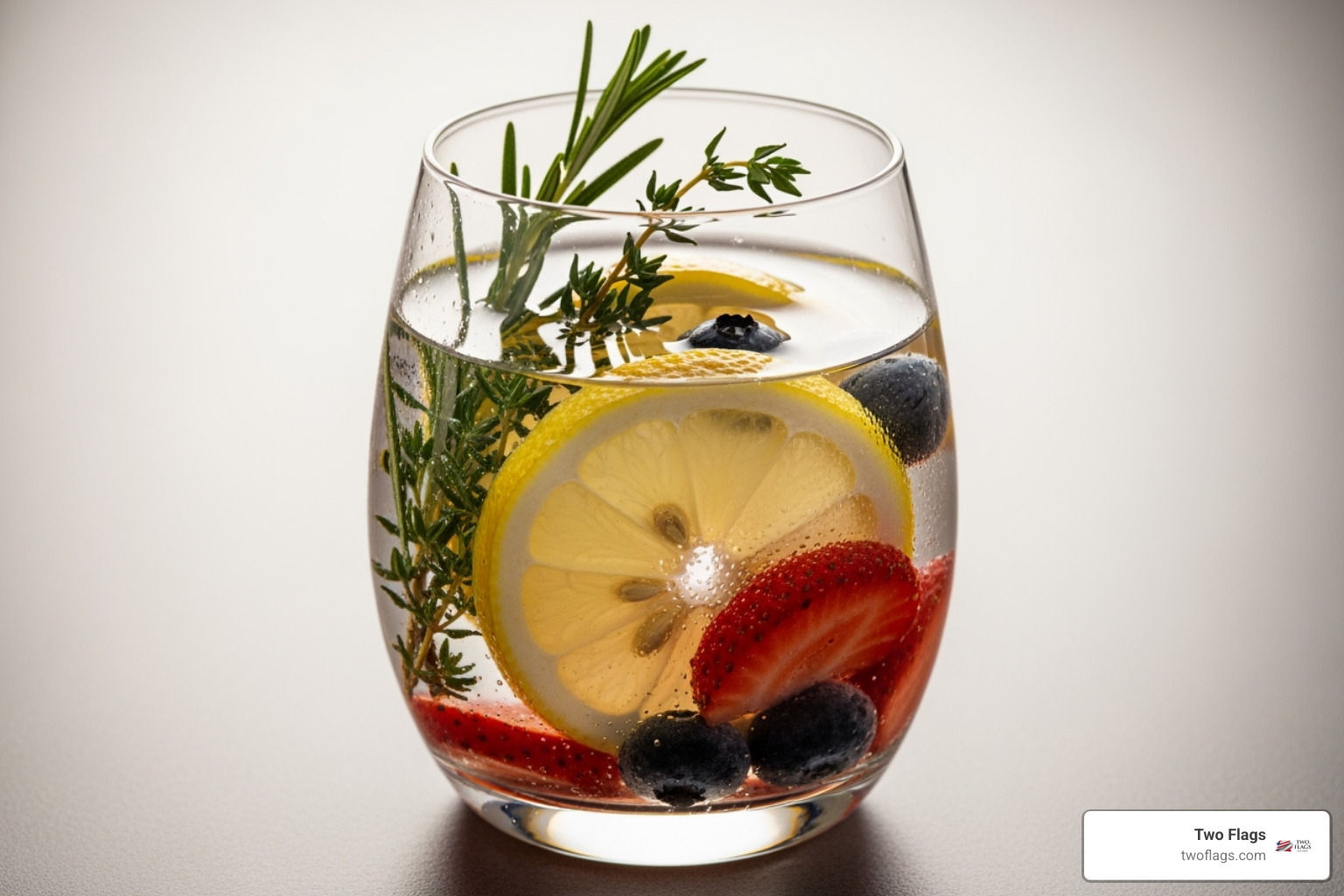
But here's where things get murky. Many mass-produced flavored vodkas rely on artificial aroma chemicals and synthetic flavorings. These lab-created compounds might deliver consistent flavor, but they lack the depth and complexity that comes from real ingredients. When we ask is vodka natural, these artificial additions certainly push the answer toward "not so much."
Beyond flavorings, some vodkas contain what the industry calls "processing aids." Glycerin might be added to create a smoother mouthfeel and subtle sweetness. While glycerin occurs naturally during fermentation, adding extra amounts is a deliberate choice to alter the spirit's character. Sugar and citric acid sometimes make appearances too, often used to balance flavors or mask impurities in lower-quality spirits.
This is where additive-free vodka shines. These spirits focus purely on the quality of their base ingredients and the skill of their production process. No shortcuts, no artificial improvements - just the natural character of grain or potato and pristine water working together.
At Two Flags One Spirit, we believe in letting our organic Polish ingredients speak for themselves. When you have exceptional raw materials and careful craftsmanship, there's no need for artificial assistance. The subtle nuances of our rye and potato bases create all the character we need. Find more about sustainable and organic vodka choices.
Exploring Non-Traditional Ingredients in Vodka Crafting
While our Two Flags One Spirit vodka proudly showcases traditional organic Polish ingredients like rye and potato, the broader vodka world reveals fascinating possibilities. The beauty of this spirit lies in its versatility - almost anything containing fermentable sugars or starches can become vodka.
Corn-based vodkas bring subtle sweetness and buttery notes to the glass. Grape-based spirits offer crisp, mildly fruity characteristics that might surprise wine lovers. Rice vodka creates unique, earthy flavors reminiscent of fine sake's clean finish.
Some truly innovative distillers have experimented with sugar cane, creating spirits with tropical undertones. Others have worked with maple sap, bringing hints of Vermont's finest to their bottles. Honey-based vodkas offer floral complexity, while quinoa creates surprisingly smooth, nutty profiles.
The most adventurous producers have even tried whey - yes, from dairy production - resulting in vodkas with clean, sweet, and subtly lactic characteristics. It sounds unusual, but the results can be remarkably pleasant.
These diverse ingredients demonstrate vodka's natural adaptability and distillers' creativity worldwide. Each base material contributes its own flavor profile, proving that vodka is far from the flavorless spirit many imagine.
However, the ultimate quality still depends on distilling skill, water purity, and attention to detail. Our commitment at Two Flags remains rooted in showcasing what organic Polish rye and potato can achieve when treated with respect and traditional craftsmanship. We honor centuries of Polish vodka-making tradition while meeting today's expectations for purity and exceptional taste.
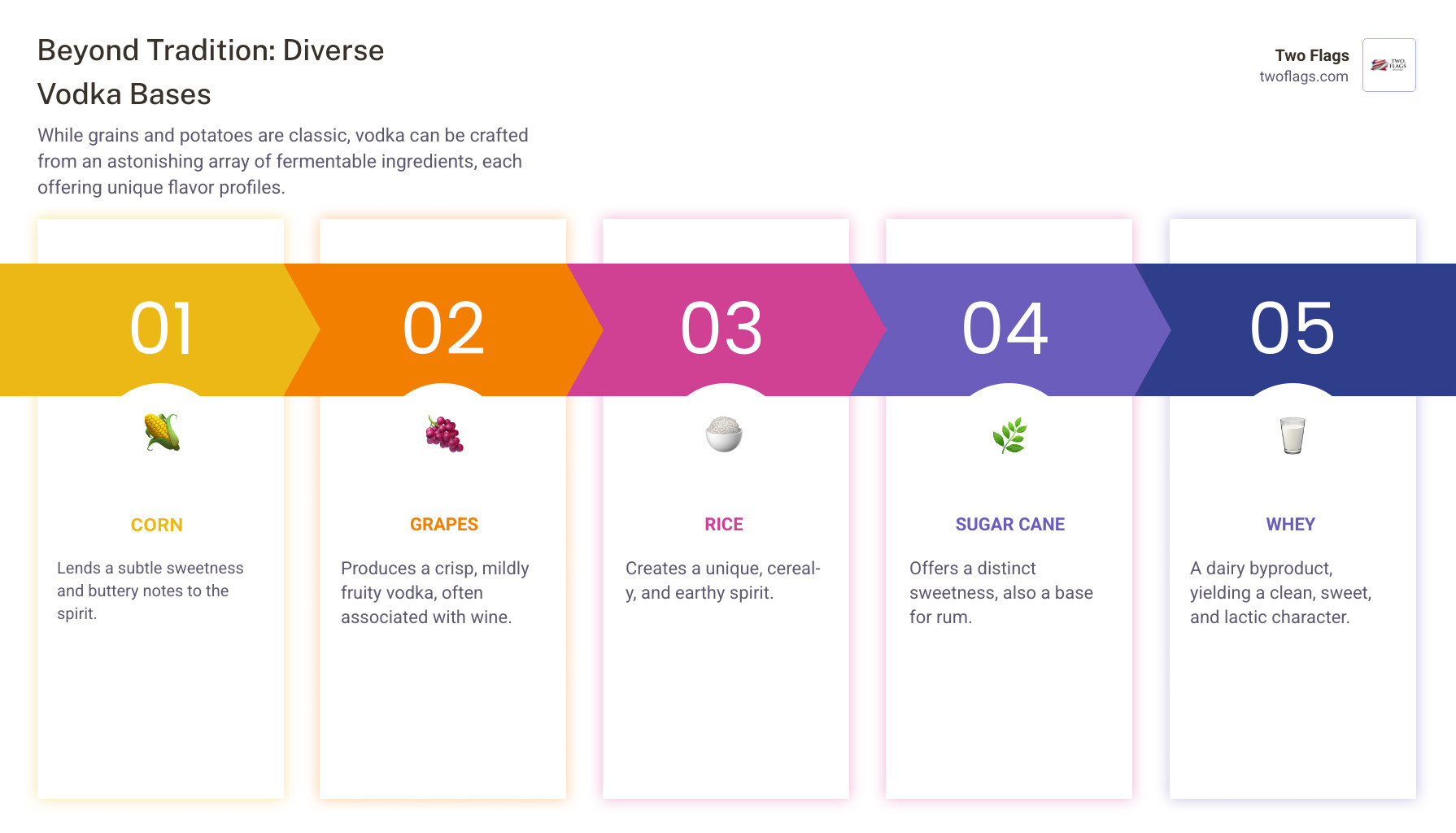
Frequently Asked Questions about Natural Vodka
When people find the complexity behind is vodka natural, they often have burning questions. Let me share the answers to the most common ones we hear at Two Flags.
Does the base ingredient really change the taste of vodka?
Yes, absolutely! This might be the biggest myth I love busting. Despite vodka's reputation as a neutral spirit, each base ingredient leaves its signature on the final product.
Rye-based vodkas like our Two Flags One Spirit carry distinctive spicy, peppery notes that dance on your palate. There's a complexity there that wheat simply can't match. Wheat vodkas tend to be softer and subtly sweet, creating an almost silky mouthfeel.
Potato vodkas offer something completely different - a creamy texture with earthy, sometimes nutty undertones. It's like comparing silk to velvet; both are smooth, but each has its own character. Corn-based vodkas often present buttery sweetness that's unmistakable once you know what to taste for.
The idea that vodka is completely flavorless? That's just a generalization that doesn't hold up when you really pay attention. True vodka lovers can absolutely discern these subtle yet distinct profiles.
Is all vodka gluten-free?
Here's where science comes to the rescue. Generally, yes - but let me explain why there's a "but" in there.
The distillation process effectively removes gluten proteins from the spirit. So pure, distilled vodka is considered gluten-free, whether it started from wheat, rye, or potatoes. The intense heat and separation process leaves those proteins behind.
However, for those with severe sensitivities, there's a small risk of cross-contamination during production. Sometimes flavorings added after distillation might contain gluten too.
Naturally gluten-free bases like potatoes or corn offer extra peace of mind for sensitive folks. Our Two Flags One Spirit, even though it's crafted from organic Polish rye, undergoes such a meticulous distillation process that it meets gluten-free standards.
What makes a vodka 'organic'?
Getting that organic certification isn't just about slapping a label on a bottle - it's a commitment that runs from soil to spirit.
First, the base ingredients must be certified organic. That means the grains or potatoes are grown without synthetic pesticides, herbicides, or fertilizers. The farmers work with nature instead of fighting it.
But it doesn't stop at the farm. The entire production process must follow strict organic guidelines. This means minimizing artificial additives and ensuring the spirit stays true to its organic roots throughout every step.
At Two Flags One Spirit, we proudly uphold these sustainable practices. It's not just about creating a cleaner product - though that's certainly part of it. It's about supporting sustainable agriculture and maintaining that deeper connection to natural purity that makes vodka special in the first place.
This commitment reflects our belief that when you start with the best natural ingredients and treat them with respect, the final product speaks for itself.
Conclusion: Embracing Vodka's Natural Essence
So, is vodka natural? After our journey from Polish fields to your glass, the answer is a resounding yes. Vodka begins its life as nature intended - rooted in the earth as organic grains and potatoes, nurtured by rain and sunshine, and harvested by skilled hands.
The change that follows is equally natural. Fermentation relies on yeast, those tiny biological workhorses that have been converting sugars to alcohol for thousands of years. Even distillation, while requiring human skill, simply separates what nature has already created.
Water plays the starring role in this natural story, making up 60% of every bottle. Whether drawn from pristine Polish springs or carefully purified through modern methods, quality water allows the subtle character of the base ingredients to shine through. This is why the myth of vodka being completely neutral simply doesn't hold water - pun intended.
The importance of quality ingredients cannot be overstated. When you start with exceptional raw materials, like the organic Polish grains we use in our Two Flags One Spirit vodka, you taste the difference in every sip. These ingredients carry the essence of their terroir, the unique environmental fingerprint of where they grew.
Regulations are finally catching up to what craft distillers have known all along - vodka has character. The recent changes in how vodka is defined officially recognize that this spirit can and should reflect its natural origins.
At Two Flags One Spirit, we're proud to honor this natural heritage through our Polish organic crafting methods. Every bottle represents our commitment to working with nature, not against it. From the certified organic ingredients to our traditional Polish distillation techniques, we create a vodka that celebrates rather than masks its agricultural roots.
The next time someone asks you is vodka natural, you can confidently share the real story. It's a tale of nature and craftsmanship working together, creating a spirit that's both pure and full of character. That's the essence of truly exceptional vodka.


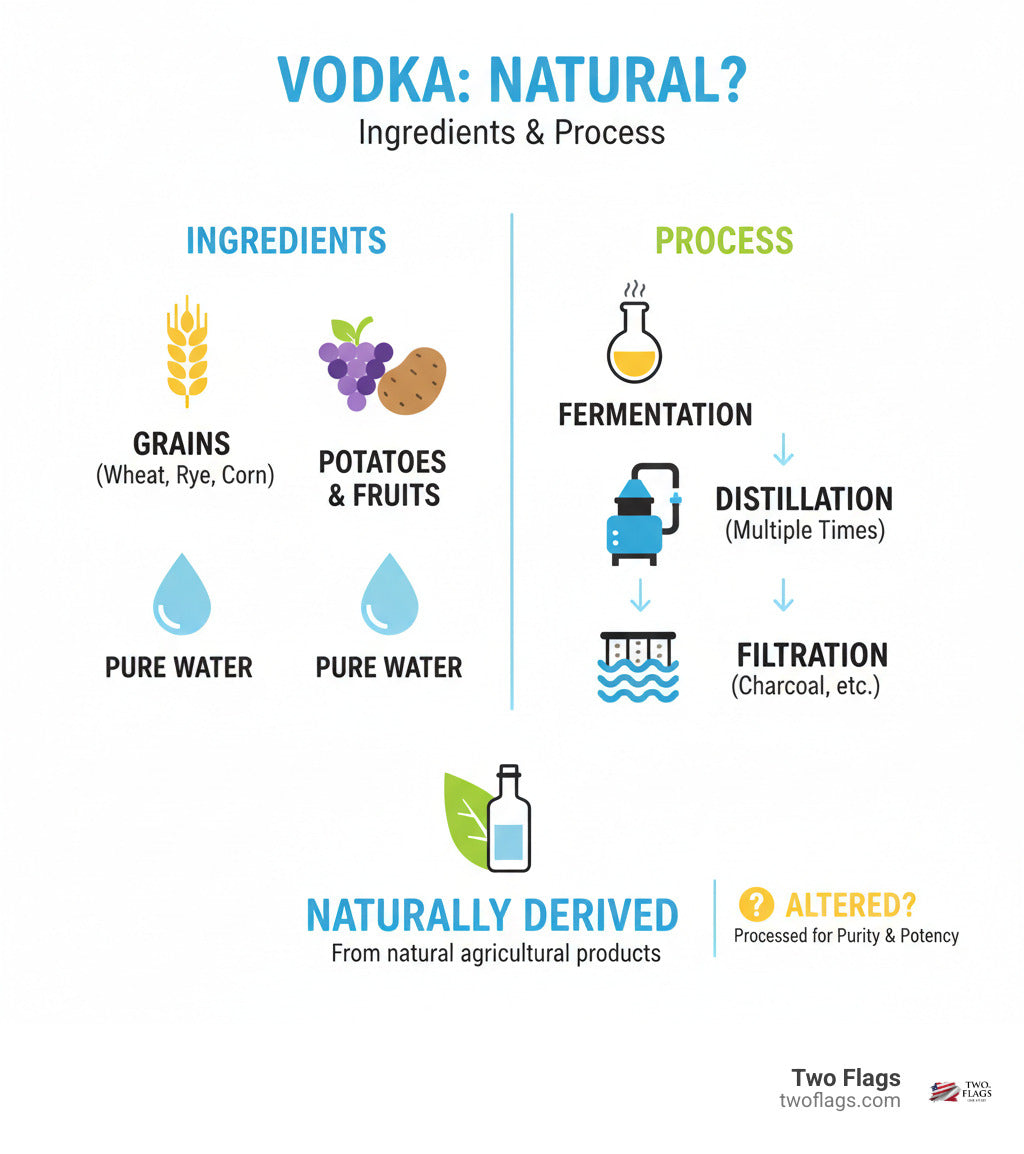


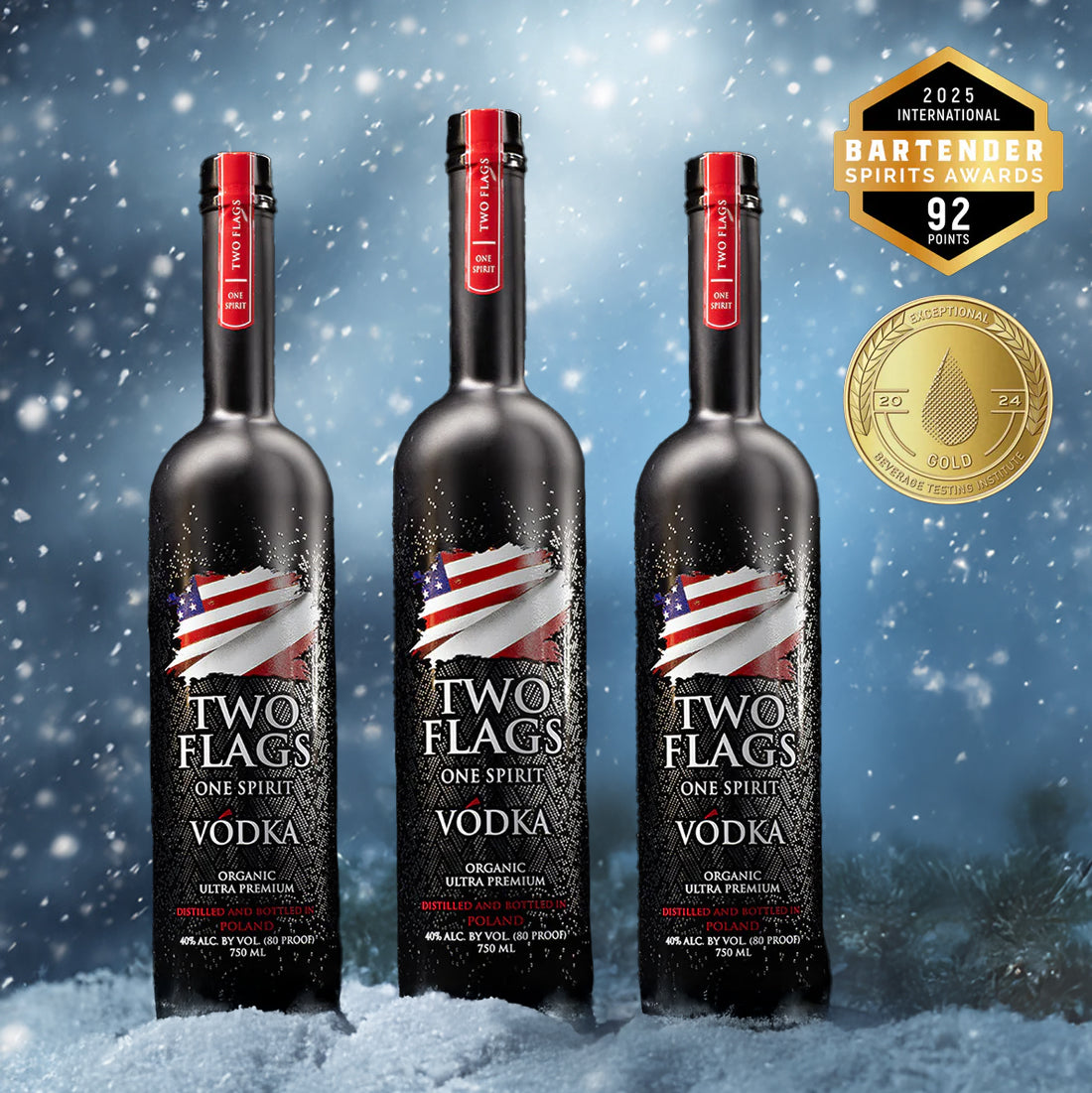
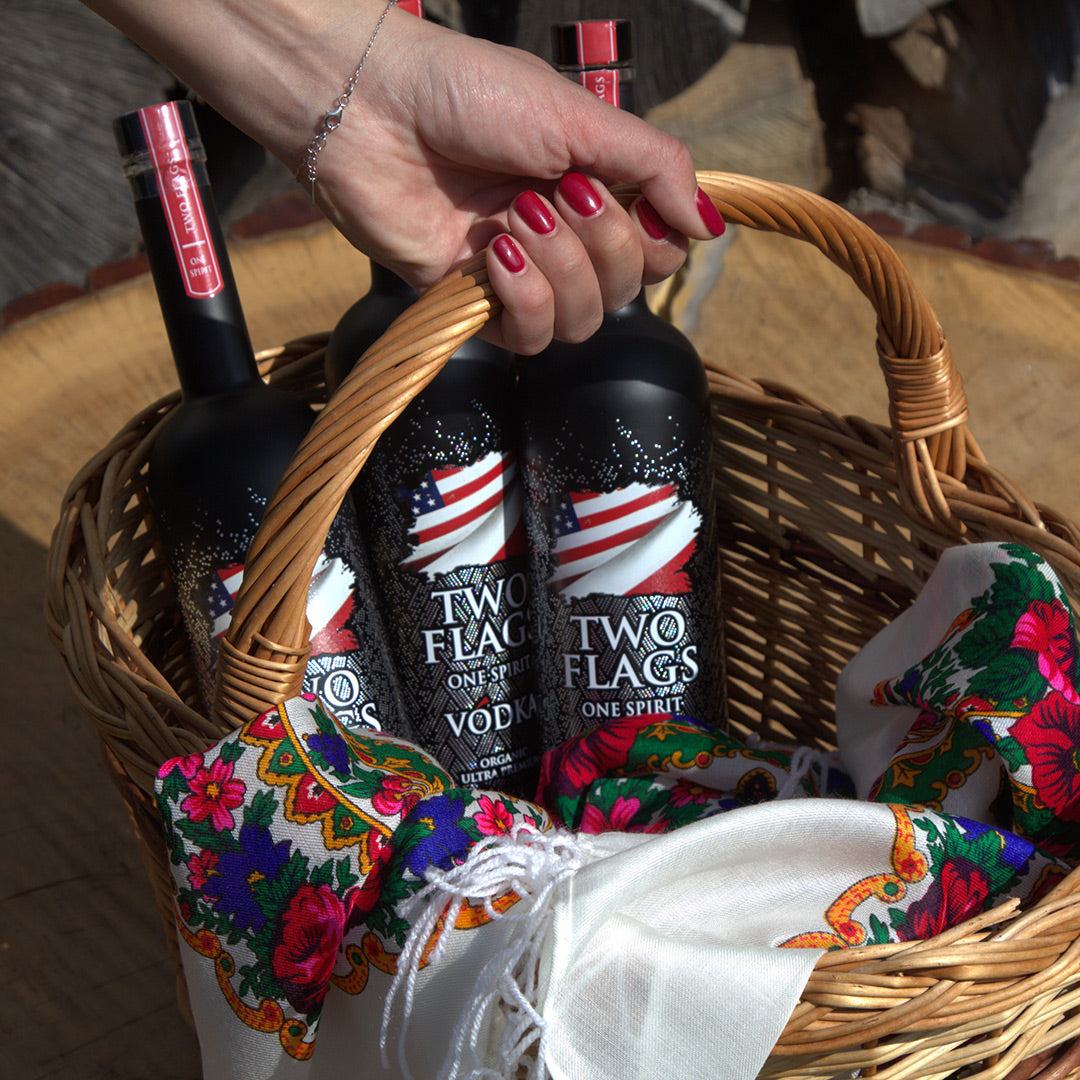
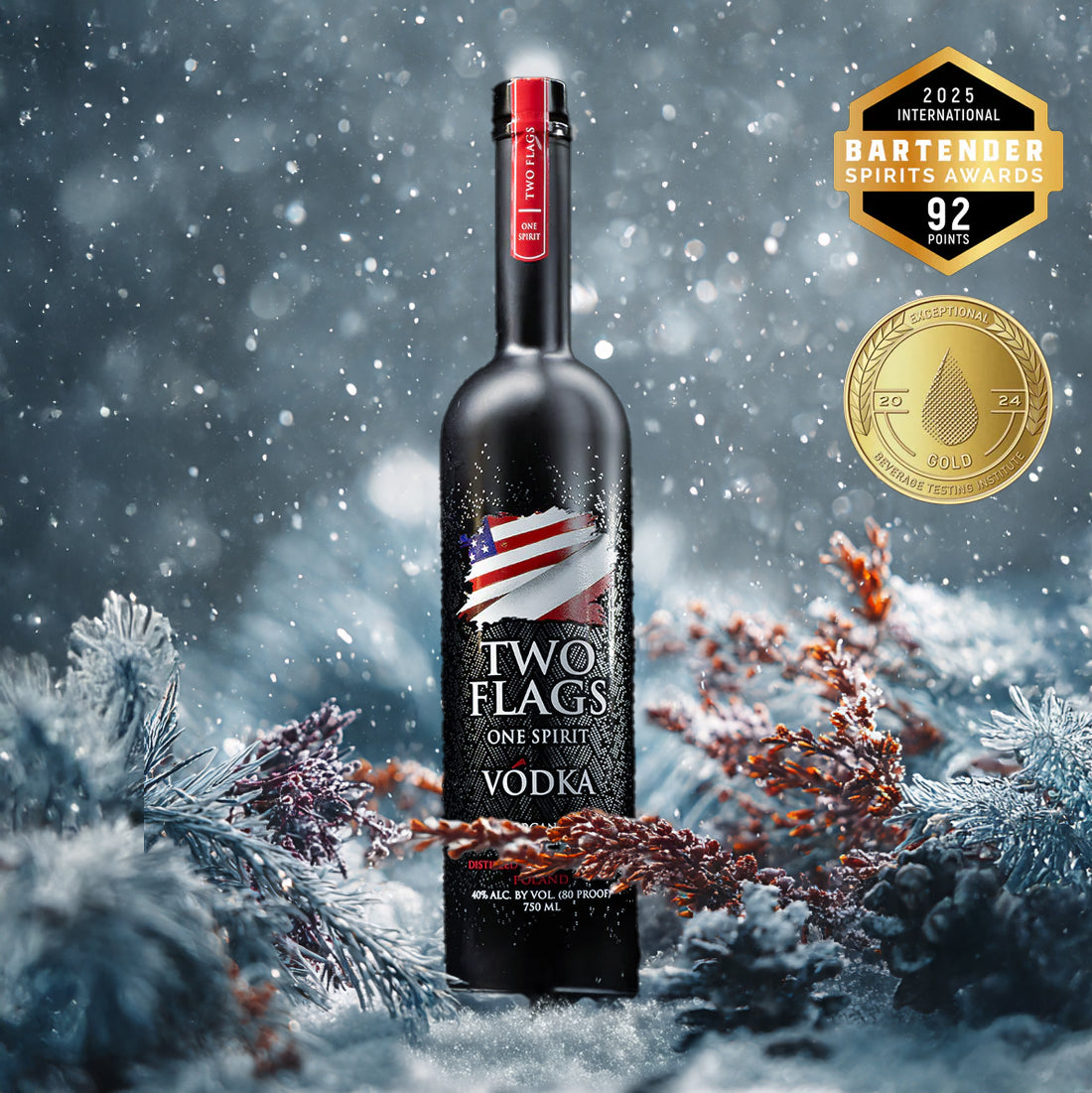
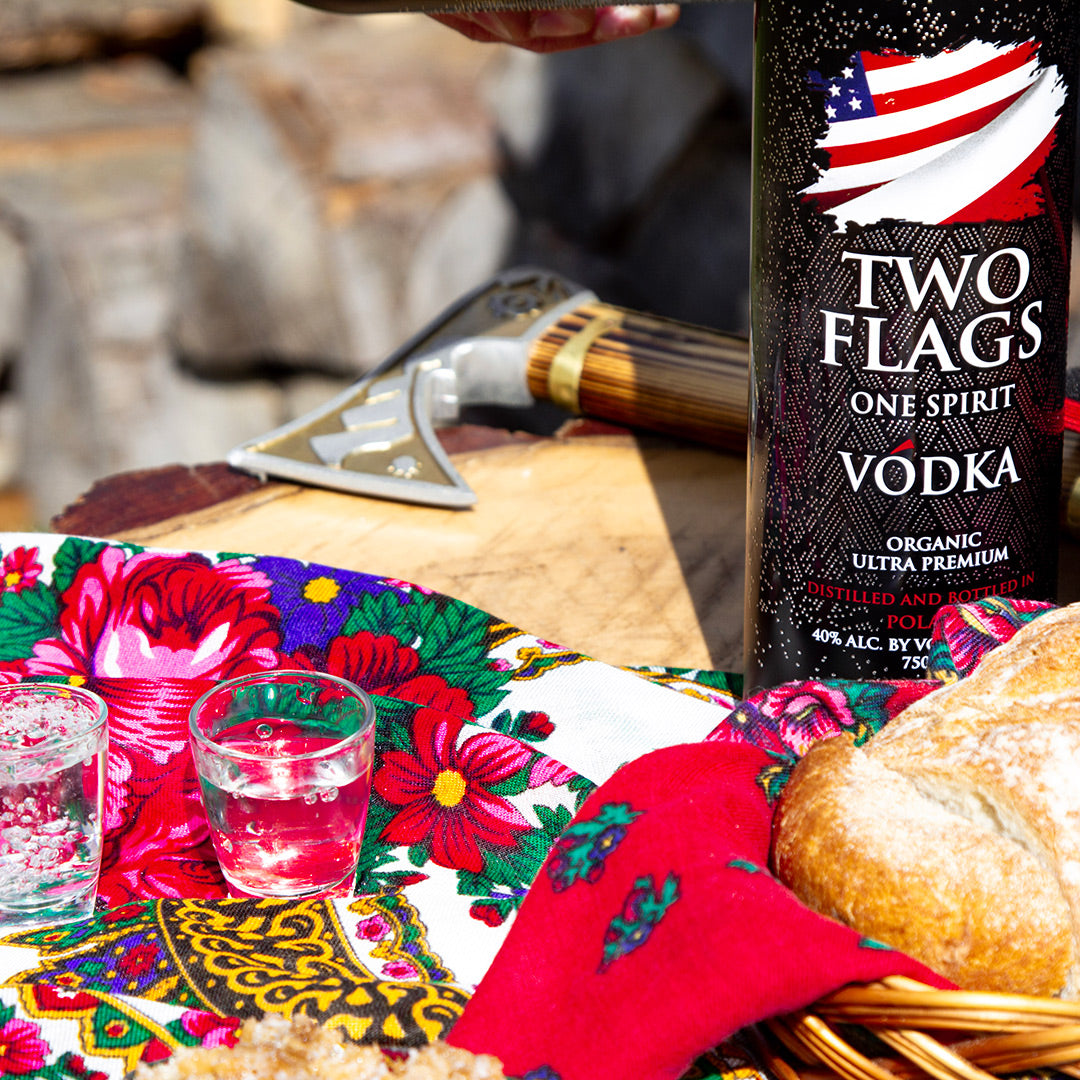
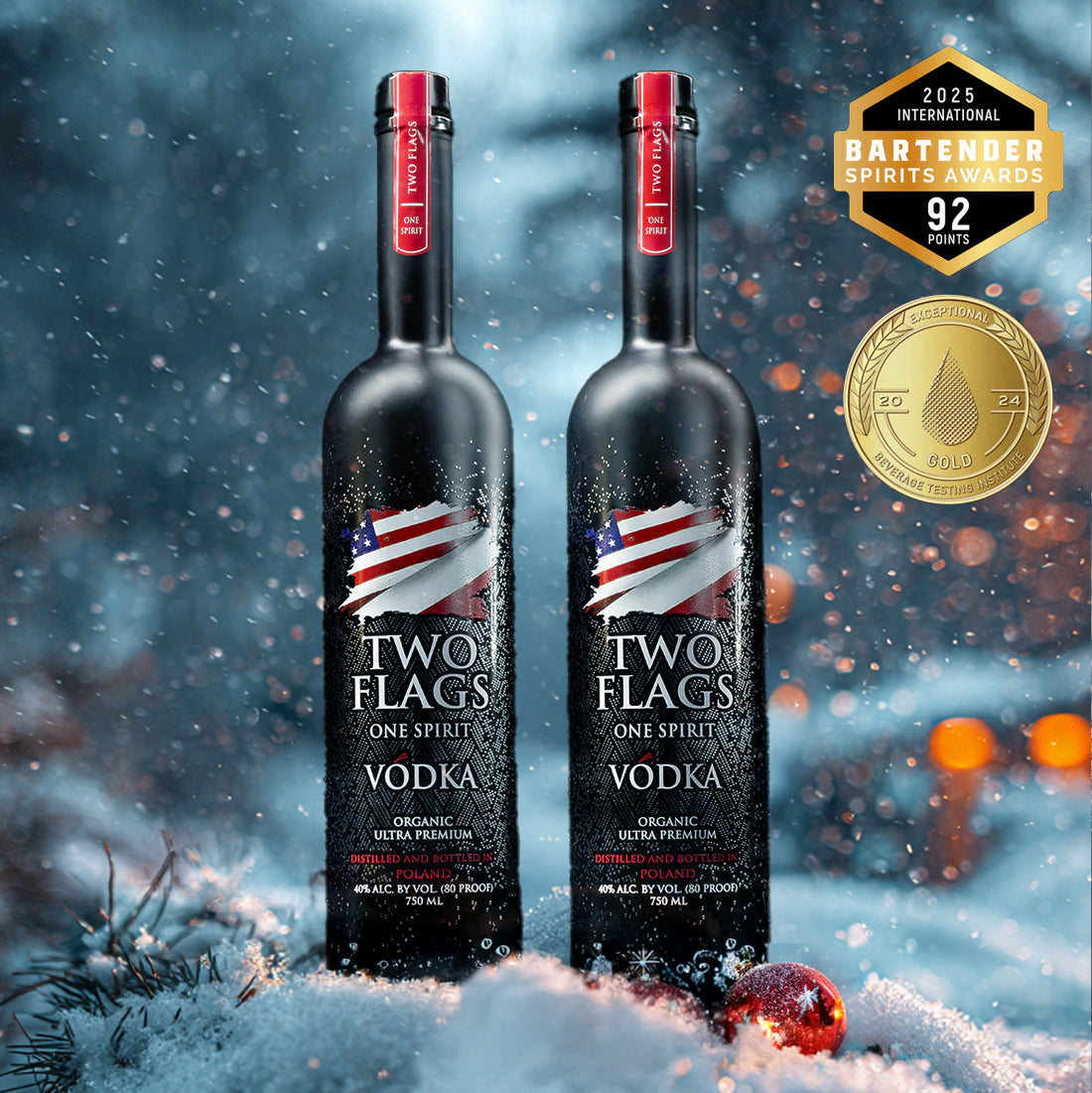
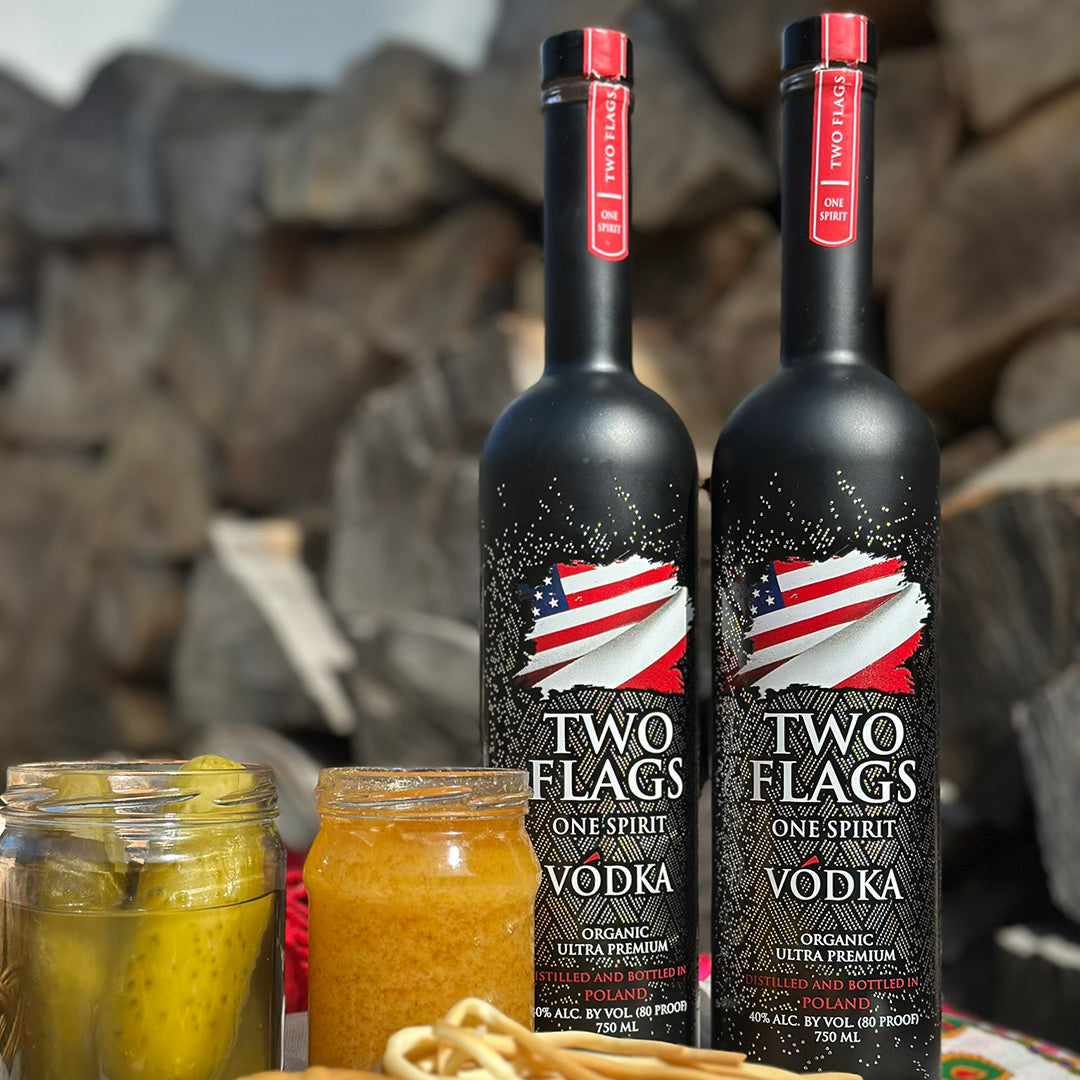
Leave a comment
This site is protected by hCaptcha and the hCaptcha Privacy Policy and Terms of Service apply.